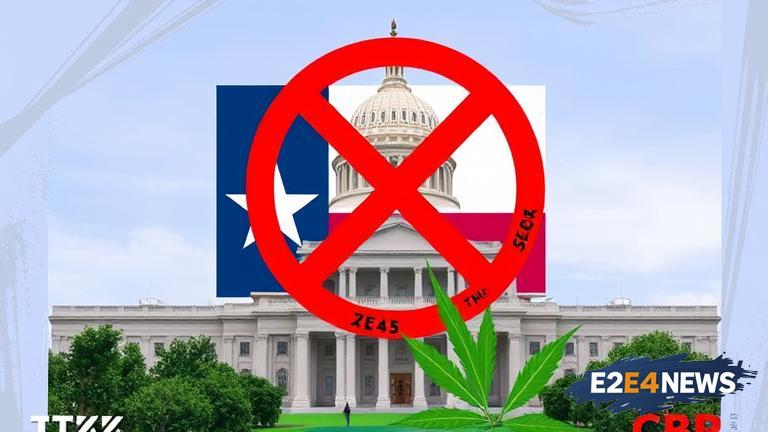The Texas Senate has passed a bill that would prohibit the sale and possession of THC, the psychoactive compound found in cannabis, in the state. The bill, which was approved with a significant majority, would make it illegal to manufacture, distribute, or possess THC in any form. However, the bill specifically exempts CBD and CBG products, which are non-psychoactive compounds also found in cannabis, from the ban. This means that products containing CBD and CBG, such as oils, tinctures, and edibles, would still be available for purchase in Texas. The bill’s authors argue that the ban on THC is necessary to protect public health and safety, as the compound can have negative effects on mental and physical health. They also claim that the ban would help to reduce the incidence of impaired driving and other THC-related crimes. On the other hand, opponents of the bill argue that it would unfairly restrict access to cannabis products that have been shown to have medicinal benefits. They also point out that the ban would likely drive the THC market underground, making it more difficult to regulate and increasing the risk of contamination and other safety issues. The bill’s passage has been met with mixed reactions from the cannabis industry, with some companies welcoming the exemption for CBD and CBG products, while others express concern about the potential impact on their businesses. The bill will now move to the Texas House of Representatives, where it is expected to face further debate and scrutiny. If the bill is approved by the House, it would then be sent to the governor’s desk for signature. The governor has not yet indicated whether he would sign the bill into law. The ban on THC would likely have significant implications for the cannabis industry in Texas, which has been growing rapidly in recent years. The industry has created thousands of jobs and generated millions of dollars in revenue for the state. However, the ban could also have positive effects, such as reducing the incidence of THC-related crimes and improving public health and safety. The exemption for CBD and CBG products is seen as a compromise, allowing companies to continue to manufacture and sell these products while still addressing concerns about the risks associated with THC. The bill’s authors have stated that they are open to making changes to the bill as it moves through the legislative process, and it is possible that the final version of the bill could be significantly different from the current draft. The cannabis industry is likely to continue to lobby for changes to the bill, and it is possible that the bill could be amended to allow for the sale and possession of THC in certain circumstances, such as for medicinal purposes. The bill has also sparked debate about the potential benefits and risks of cannabis, with some arguing that it has medicinal benefits and others claiming that it is a gateway to more serious drug use. The issue is likely to continue to be a topic of discussion and debate in the coming months and years. The Texas Senate’s passage of the bill is seen as a significant step towards regulating the cannabis industry in the state, and it is likely that other states will be watching the situation closely. The bill’s impact on the cannabis industry and the state’s economy is likely to be significant, and it will be important to monitor the situation closely in the coming months and years. The ban on THC is likely to have significant implications for the state’s law enforcement agencies, which will be responsible for enforcing the new law. The agencies will need to develop new strategies and protocols for detecting and prosecuting THC-related crimes, and it is likely that they will face significant challenges in doing so. The bill’s passage has also sparked concerns about the potential impact on the state’s hemp industry, which is a significant sector of the state’s economy. The hemp industry is likely to be affected by the ban on THC, and it is possible that the bill could have unintended consequences for the industry. The Texas Senate’s passage of the bill is a significant development in the ongoing debate about cannabis regulation in the state, and it is likely that the issue will continue to be a topic of discussion and debate in the coming months and years.
